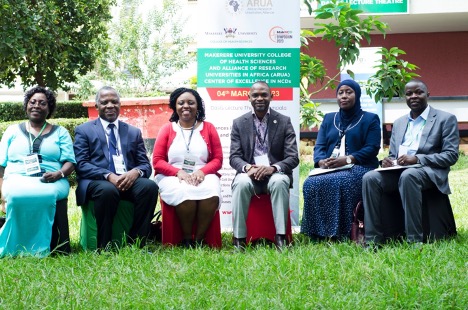Stakeholders pledged to work together to address the growing burden of Non-Communicable Diseases (NCDs) in Uganda and beyond. The pledge was made at the NCDs Symposium held on Saturday 4th March 2023 and hosted by Makerere University College of Health Sciences (MakCHS), as a member of the Alliance of Research Universities in Africa (ARUA) NCD Centre of Excellence. The theme of the symposium was ‘Advances in NCD Training, Research and Community Impact’.
Research shows that, globally, non-communicable diseases (NCDs) are responsible for a significant proportion of deaths, with 41 million people dying from these chronic diseases each year. NCDs, also known as chronic diseases, tend to be of long duration and are the result of a combination of genetic, physiological, environmental and behavioural factors. The main types of NCD are cardiovascular diseases (such as heart attacks and stroke), cancers, chronic respiratory diseases (such as chronic obstructive pulmonary disease and asthma) and diabetes.
NCDs disproportionately affect people in low- and middle-income countries, where more than three-quarters of global NCD deaths (31.4 million) occur. In Uganda, the number of people living with NCDs has been increasing dramatically, making NCDs a major public health threat. For instance, 74,354 new cases of diabetes were seen at health facilities in Uganda in 2009-10 compared to 58,523 five years earlier showing an increase of 27% (HMIS data 2009/10). In 2013, the Uganda Diabetes Association revealed that over 200,000 children had diabetes and expressed fears the number could be higher because many of the children do not report to the hospital for diagnosis.
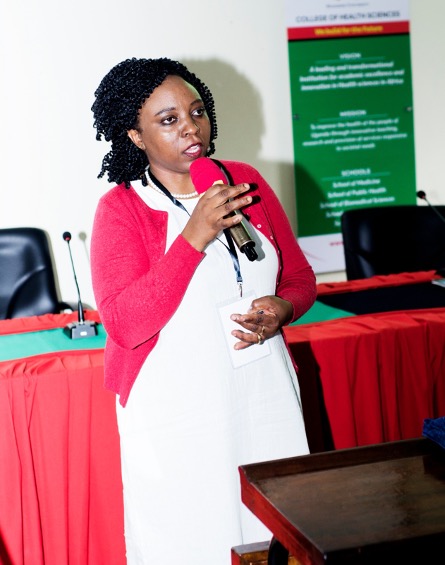
In her remarks as host, Professor Damalie Nakanjako, The Principal College of Health Sciences, Makerere University, in a special way welcomed participants to the Symposium and noted that the purpose of the event was to showcase the latest advances in NCD training, research, and community impact, and to provide a platform for stakeholders to engage and collaborate on issues related to NCDs.
Citing WHO data, Professor Nakanjako noted that NCDs represent the largest cause of mortality in adults with 86% of these premature deaths occurring in middle-income countries such as Uganda. She further pointed out that the incidence of NCDs among children, particularly diabetes, is increasing, indicating the urgent need for attention.
Professor Nakanjako stressed the importance of data-driven interventions, knowledge translation, and a multi-sectoral approach in addressing NCDs, and called for more investment in NCD research, collaborations, and regular exercise among children. She also reiterated Makerere University's commitment to addressing NCDs through continuous advances in NCD training, research, and community engagement.
WHO Key Facts On Non-Communicable Diseases (NCDs)
- Non-communicable diseases (NCDs) kill 41 million people each year, equivalent to 74% of all deaths globally.
- Each year, 17 million people die from a NCD before age 70; 86% of these premature deaths occur in low- and middle-income countries.
- Of all NCD deaths, 77% are in low- and middle-income countries.
- Cardiovascular diseases account for most NCD deaths, or 17.9 million people annually, followed by cancers (9.3 million), chronic respiratory diseases (4.1 million), and diabetes (2.0 million including kidney disease deaths caused by diabetes).
- These four groups of diseases account for over 80% of all premature NCD deaths.
- Tobacco use, physical inactivity, the harmful use of alcohol and unhealthy diets all increase the risk of dying from an NCD.
- Detection, screening and treatment of NCDs, as well as palliative care, are key components of the response to NCDs.
During his speech, Dr. Fred Bukachi, the Director of ARUA Centre of Excellence for NCDs, highlighted the urgent need to address the rising prevalence of non-communicable diseases (NCDs) in the region and beyond through research, capacity building, and dissemination of findings. The Centre's main objective is to develop scientific evidence for NCD policies, prevention, management, and control, while engaging with communities. To achieve this, Dr. Bukachi presented several strategies, including the creation of multi-disciplinary research programs, a training research and mobility program, an NCD research and data repository for Africa, and an annual international NCD symposium.
In addition, Dr. Bukachi emphasized the Centre's commitment to improving the health and well-being of people in sub-Saharan Africa and beyond by addressing the NCD epidemic through research and capacity building. The audience responded positively to his presentation, with many impressed by the Centre's ambitious goals and plans for tackling NCDs in Africa.

In his remarks, read by Dr. Frank Mugabe, Dr. Oyoo Charles Akiya, the Commissioner of Health Services-NCD Ministry of Health, stated that non-communicable diseases and injuries (NCDIs) are on the rise in Uganda. He revealed that the burden of NCDs has more than doubled in the last 20 years, with 22% of adults at risk of premature death (30-70 years) as of 2016. NCDs account for 41% of all deaths in the country.
Dr. Akiya cited the NCD risk factor survey and other studies, highlighting heavy alcohol consumption in men and women, consumption of unhealthy diets, tobacco use, physical inactivity, and obesity as some of the problems that need urgent attention. Data on high burden NCD conditions reveal that 24% of adults in Uganda suffer from hypertension requiring treatment, with only 24.3% accessing treatment. The prevalence of diabetes is estimated at 1.4%, and there is a high prevalence of sickle cell disease in the central, eastern, and northern parts of the country, with 1.3% of the population having the trait.
Mental health disorders, especially depression, are also prevalent, with over one million Ugandans experiencing depression.
On government efforts towards NCDS, Akiya revealed that Uganda is conducting the 2nd risk factor survey thanks to the World Health Organization and the School of Public Health.
Moving forward, Dr. Akiya proposed priority areas for research and training ; including the need to quantify the level of misinformation around diabetes treatment, implement preventive programs for known carrier communities of sickle cell disease, determine the cause and risk factors for increased cases of gastrointestinal cancer in Southwestern Uganda, understand the biomass gap and its correlation to chronic respiratory diseases, determine the gap in mental health service provision among general health workers, reduce the cost of kidney chronic disease transplant services, increase awareness of cardiovascular disease screening, and determine and document the cost of road traffic-associated injuries to the health sector and the country to halt these conditions.
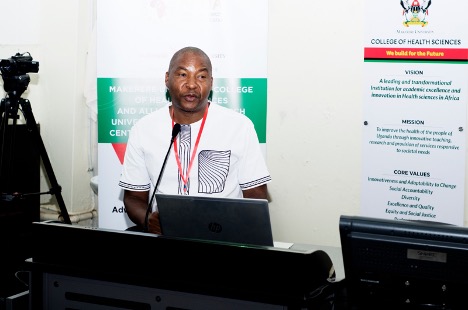
In his remarks as Chief Guest, Professor Umar Kakumba, on behalf of Makerere University’s Vice Chancellor Professor Barnabas Nawangwe, commended academia for their role in addressing emerging health threats, adding that Makerere University, as a research-led institution, is committed to supporting NCD activities through training, research, and community engagement. He emphasized that beyond training and research, there is a need to go to communities and share knowledge, as there is a gap in knowledge uptake around NCDs.
Professor Kakumba also highlighted the role of the private sector in supporting these causes, as a healthy population is key to their business success. He thanked Arua partners for taking the lead in addressing NCDs, which are responsible for 71% of global deaths and 85% of premature deaths in low and middle-income countries, including Uganda.
Moving forward, Professor Kakumba proposed a collaborative effort among stakeholders to address NCDs comprehensively. He emphasized the need for a holistic approach that involves the government, private sector, civil society organizations, and academia to address the growing burden of NCDs in Uganda.
He reiterated the commitment of Makerere University in supporting NCD activities through research, training, and community engagement, and he called on other institutions to join in this effort to achieve a healthier population and a more prosperous country.
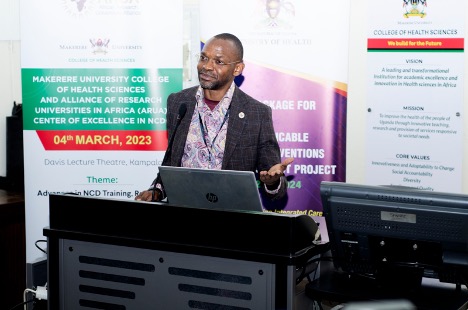
In her remarks, Dr. Kasule Hasifa discussed the priority areas for research and training in non-communicable diseases (NCDs) identified by the World Health Organization (WHO), including the need to prevent and control NCDs through public health interventions and policies, address the social determinants of NCDs such as poverty and education, improve healthcare accessibility and quality particularly in low- and middle-income countries, strengthen health systems to better respond to the growing burden of NCDs, and promote research on the causes, prevention, and treatment of NCDs.
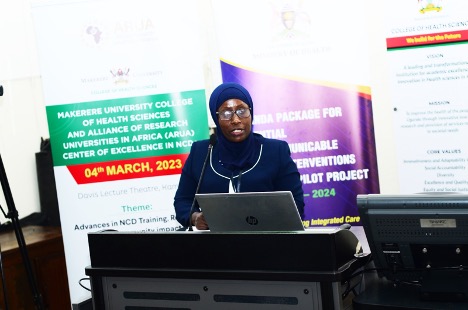
The event featured presentations from several NCD groups at MakCHS, including Cardiovascular Diseases, Renal Diseases, Diabetes Mellitus & Other Endocrine Disorders, Cancers, Mental Health Disorders, Respiratory Diseases and Lung Health, Sickle Cell Disease, and Other Haematological Conditions, as well as Interactions between NCDS and Infectious Diseases.
The symposium was attended by researchers, students, academicians, policymakers, practitioners, and health advocates with a special interest in NCDs. The day was crowned off with cake-cutting and all participants pledging to work together in addressing NCDs.

At the symposium, stakeholders agreed that it is crucial to work collaboratively to comprehensively address the growing burden of NCDs in Uganda. They recognized the need to implement preventive programs, increase awareness of cardiovascular disease screening, improve healthcare accessibility and quality, particularly in low- and middle-income countries, and promote research on the causes, prevention, and treatment of NCDs. It was emphasized that a holistic approach involving the government, private sector, civil society organizations, and academia is necessary to achieve a healthier population and a more prosperous country
